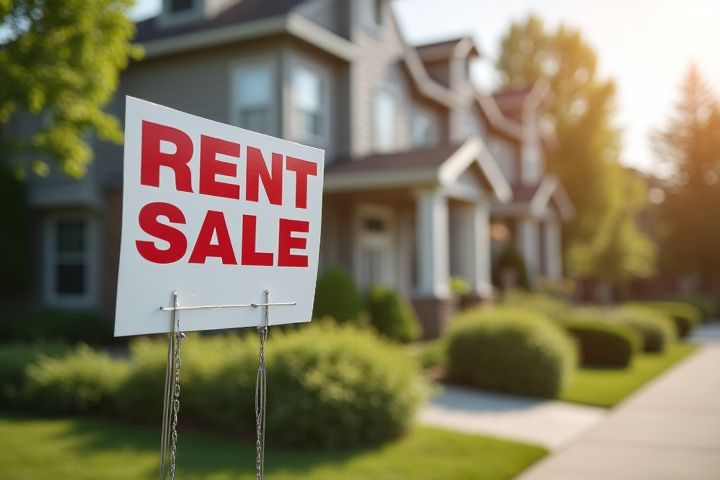
Yes, you can rent out a house you just bought, but certain considerations are essential. First, check local zoning laws and homeowners association guidelines, as these regulations can dictate your ability to rent. You'll also want to consider mortgage terms; some lenders require owner-occupancy for a specific period before allowing rentals. Setting a competitive rental price based on the local market ensures your property attracts tenants while providing you with a return on investment. Lastly, ensuring your home meets safety and health standards is crucial for protecting both your tenants and your investment.
Can You Rent Out A House You Just Bought
Mortgage terms
If you have recently purchased a house and hold a mortgage, you can generally rent it out, but you must verify the specific terms of your mortgage agreement. Many lenders include clauses that require you to obtain permission before converting your property into a rental, typically for financial protection. Additionally, consider the potential tax implications and responsibilities as a landlord, which may include property management and adhering to local regulations. Being aware of your mortgage's interest rate, monthly payments, and any penalties related to renting can help you effectively manage your investment.
Local zoning laws
Before renting out a newly purchased home, it's crucial to investigate local zoning laws, as they vary widely depending on the municipality. Certain areas may have restrictions on short-term rentals, while others could require specific permits or licenses. For example, cities like San Francisco impose strict regulations regarding rental properties, which mandate registration and adherence to safety codes. Understanding these laws can help you avoid fines and ensure compliance, safeguarding your investment and your rights as a landlord.
Rental income tax implications
When you rent out a house you just purchased, the rental income you earn is subject to taxation, which may significantly influence your overall profitability. You must report this income to the Internal Revenue Service (IRS) using Schedule E of your tax return. Additionally, you can deduct various expenses related to the property, such as mortgage interest, property taxes, repairs, and depreciation, which can lower your taxable income. It's essential to maintain thorough records of all income and expenses to ensure compliance and maximize your tax benefits.
Property management
Renting out a recently purchased house typically involves efficient property management to maximize return on investment. Ensure your property complies with local rental laws, which may require inspections or permits, and research competitive rental pricing to attract tenants. Utilize property management software to streamline tenant applications, rent collection, and maintenance requests, boosting your operational efficiency. You might also consider hiring a professional property management company, which can offer expertise in tenant screening and handling day-to-day issues, allowing you to focus more on your investment strategy.
Landlord insurance
Renting out a newly purchased house often requires acquiring landlord insurance to protect your investment. This specialized coverage safeguards against property damage, liability claims, and loss of rental income, ensuring financial stability. Typically, landlord insurance policies can range from $800 to $1,200 annually, depending on property location and value. By properly insuring your rental property, you can mitigate risks while maximizing your rental income potential.
Lease agreements
Yes, you can rent out a house you just bought, but you must first review and understand the lease agreements involved. A lease agreement is a legally binding contract between you as the landlord and your tenant, outlining rent, duration, and responsibilities. It's crucial to adhere to local rental laws, which can include rental rates, security deposits, and maintenance obligations, ensuring compliance with ordinances specific to your area. Specialized lease forms may vary by region; therefore, consider consulting legal experts to draft or review the lease before finalizing agreements with tenants.
Market rent rates
Renting out a recently purchased house involves understanding the current market rent rates in your area. These rates typically depend on factors such as location, property size, and local amenities, which can significantly influence your rental income. You can use online platforms or consult real estate professionals to gather detailed insights on comparable properties and their rental prices. By aligning your rental price with market trends, you can attract potential tenants and ensure a steady cash flow from your investment.
Tenant screening process
After purchasing a house, you can rent it out by implementing a thorough tenant screening process. Start by advertising the property on popular rental platforms, ensuring to provide clear details like the rent amount and available amenities. When applicants express interest, conduct background checks that include credit history, rental history, and criminal records to ensure they meet your standards. The ideal tenant should have a stable income that is at least three times the rent, along with positive references from previous landlords or property managers.
Maintenance responsibilities
When you rent out a recently purchased house, your maintenance responsibilities include ensuring the property is safe and habitable, as mandated by local housing codes. Regular upkeep, such as servicing HVAC systems, inspecting plumbing, and addressing landscaping, is essential to prevent costly repairs later. You are also responsible for responding promptly to tenant maintenance requests, ideally within 24 hours, to maintain a positive landlord-tenant relationship. Understanding your local laws regarding response times and maintenance obligations can significantly impact your rental experience and help you retain quality tenants.
Homeowner association rules
When renting out a newly purchased house, it's essential to review the Homeowners Association (HOA) rules, as they often dictate rental policies. Many HOAs have specific regulations regarding rental properties, which could include restrictions on the duration of rentals, tenant screening processes, or even a limit on the percentage of homes that can be rented within the community. For instance, an HOA might require a minimum lease term of one year or may prohibit short-term rentals entirely, impacting your potential rental income. You should consult the HOA's governing documents and potentially attend a board meeting to ensure compliance and avoid fines or penalties.
